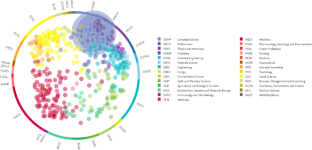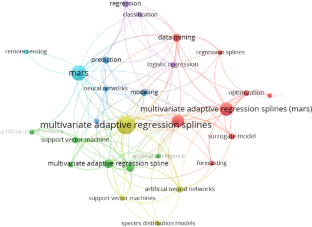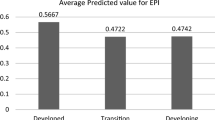Abstract
The article deals with an optimal multivariate adaptive regression spline that describes the dependence of the countries’ digital development on the national cyber security index and accessible business. It is based on predictive methods of intelligent data analysis. The objects of the study are 103 countries. The statistical data of the investigated indicators of these countries were used for 2021 according to the reports of the e-Governance Academy and the World Bank Doing Business Group. The originality of the research lies in the multivariate adaptive regression spline of countries’ digital development level developed by the authors. The research is implemented within the scope of execution of four stages. A multiple regression model was developed to compare the results of the classical regression model and the results obtained by the MARS model, characterizing the influence of the national cyber security index and ease of doing business on digital development. Its development was implemented in the third stage. Both independent variables positively and directly affect the dependent indicator. At the same time, the influence of the “ease of doing business” index is four times greater than the national cyber security index, caused by the mass use of digital technologies in all business areas and the digital economy, and that is a stimulating factor of economic development. The absence of multicollinearity in the predictor variables was proven using the variance inflation factor test, and the statistical significance of the model — using the Student’s test, coefficient of determination, standard error of estimate, mean absolute error, Fisher’s test, and ANOVA. The MARS model was developed using the Salford Predictive Modeler software. The quality of the model is based on the generalized cross-validation criterion. The obtained results made it possible to comprehensively determine the influence of the cyber security national index and ease of doing business on the country’s digital development under study and can be used by analytical departments of socio-economic objects (banks, financial institutions), national cyber police bodies, national cyber security coordination centers for economic development and sustainable growth.


Source: interactive analysis of the Scopus.com platform


Source: compiled by the authors by means of Statgraphics 19 toolkits

Source: compiled by the authors by means of Salford Predictive Modeler
Similar content being viewed by others
Explore related subjects
Discover the latest articles and news from researchers in related subjects, suggested using machine learning.Data Availability
The datasets used during the current study are available from the corresponding or first author on reasonable request.
References
Adaptivereg Procedure: SAS. URL: http://support.sas.com/documentation/cdl/en/statug/65328/HTML/default/viewer.htm#statug_adaptivereg_overview.htm (accessed 15 Feb 2023)
Affes, Z., Hentati-Kaffel, R. (2019). Forecast bankruptcy using a blend of clustering and MARS model: Case of US banks. Annals of Operations Research 281, 27–64. https://doi.org/10.1007/s10479-018-2845-8
Ahmed, R. R., Streimikiene, D., Channar, Z. A., Soomro, R. H., & Streimikis, J. (2021). E-banking customer satisfaction and loyalty: Evidence from serial mediation through modified E-S-QUAL model and second-order PLS-SEM. Engineering Economics, 32(5), 407–421. https://doi.org/10.5755/J01.EE.32.5.28997
Androniceanu, A., Georgescu, I., & Sabie, O. M. (2022). Comparative research on government effectiveness and political stability in Europe. Administratie Si Management Public, 2022(39), 63–76. https://doi.org/10.24818/amp/2022.39-04
Andronie, M., Lazaroiu, G., Stefanescu, R., Ionescu, L., & Cocosatu, M. (2021). Neuromanagement decision-making and cognitive algorithmic processes in the technological adoption of mobile commerce apps. Oeconomia Copernicana, 12(4), 1033–1062. https://doi.org/10.24136/oc.2021.034
Augustinaitis, A., Kaivo-Oja, J., Lauraeus, T., Kiškienė, A., Bzhalava, L., & Roth, S. (2022). Evaluation of the implementation of smart specialisation strategy in Lithuanian industry. Journal of Business Economics and Management, 23(6), 1299–1314. https://doi.org/10.3846/jbem.2022.18295
Bencsik, A. (2021). The sixth generation of knowledge management – The headway of artificial intelligence. Journal of International Studies, 14(2), 84–101. https://doi.org/10.14254/2071-8330.2021/14-2/6
Bilan, S., Šuleř, P., Skrynnyk, O., Krajňáková, E., & Vasilyeva, T. (2022). Systematic bibliometric review of artificial intelligence technology in organizational management, development, change and culture. Business: Theory and Practice, 23(1), 1–13. https://doi.org/10.3846/btp.2022.13204
Boateng, E., Asafo-Adjei, E., Gatsi, J. G., Gherghina, ŞC., & Simionescu, L. N. (2022). Multifrequency-based non-linear approach to analyzing implied volatility transmission across global financial markets. Oeconomia Copernicana, 13(3), 699–743. https://doi.org/10.24136/oc.2022.021
Burca, V., Popa, A. F., Sahlian, D. N., Trasca, D. L., & Bobitan, N. (2022). Modelling the impact of earnings management on the probability of financial statements fraud. Engineering Economics, 33(5), 521–539. https://doi.org/10.5755/j01.ee.33.5.30672
Chapcakova, A., Kascakova, D. R., Heckova, J., & Kolesarova, S. (2021). Research of comparative advantages in the context of determinants of cross-border mergers and acquisitions in the European area. Montenegrin Journal of Economics, 17(4), 181–188. https://doi.org/10.14254/1800-5845/2021.17-4.16
Chen, S., Zhang, C., Yao, X., Jin, H., & Hu, Q. (2022). Comprehensive evaluation of Chinese manufacturing industry digital transformation based on a novel interval value Pythagorean fuzzy aggregation operator. Transformations in Business and Economics, 21(1), 333–370.
Dhawan, S. M., Gupta, B. M., & Elango, B. (2021). Global Cyber Security Research Output (1998–2019): A scientometric analysis. Science and Technology Libraries, 40(2), 172–189. https://doi.org/10.1080/0194262X.2020.1840487
Doing Business: The World Bank. (2021). https://www.doingbusiness.org/en/data
Friedman, J. H. (1991). Multivariate adaptive regression splines. The Annals of Statistics, 19(1), 1–67.
Fruet-Cardozo, J. V., Granados-López, P., Del Río, L.C.-L., & Perez-Galvez, J. C. (2022). Quantitative analysis of small and medium-sized enterprises (SMEs) financing in El Salvador, Central America. A situation complicated by high criminality. Economics and Sociology, 15(2), 236–252. https://doi.org/10.14254/2071-789X.2022/15-2/15
Fülöp, M. T., Topor, D. I., Ionescu, C. A., Căpușneanu, S., Breaz, T. O., & Stanescu, S. G. (2022). Fintech accounting and industry 4.0: Future-proofing or threats to the accounting profession? Journal of Business Economics and Management, 23(5), 997–1015. https://doi.org/10.3846/jbem.2022.17695
Gladden, M. E., Fortuna, P., & Modliński, A. (2022). The empowerment of artificial intelligence in post-digital organizations: Exploring human interactions with supervisory AI. Human Technology, 18(2), 98–121. https://doi.org/10.14254/1795-6889.2022.18-2.2
Gurbanov, N., Yagublu, N., Akbarli, N., & Niftiyev, I. (2022). Digitalization and the COVID-19-led public crisis management: an evaluation of financial sustainability in the Azerbaijan business sector. SocioEconomic Challenges, 6(3), 23–38. https://doi.org/10.21272/sec.6(3).23-38.2022
Ibraghimov, E. A. (2022). Management of innovation in Azerbaijan: Relationships with competitiveness and sustainable development. Marketing and Management of Innovations, 1, 247–256. https://doi.org/10.21272/mmi.2022.1-18
Ivanchenkova, L., Maslov, A., Pikhotska, O., Partyn, H., Blishchuk, K., & Pikhotska, M. (2022). The role of digital technologies in the organization of control over tax liability settlements of budgetary institutions. Business, Management and Economics Engineering, 20(2), 389–403. https://doi.org/10.3846/bmee.2022.17419
Kashcha, M., Yatsenko, V., & Gyömörei, T. (2022). Country performance in e-sport: Social and economic development determinants. Journal of International Studies, 15(4), 226–240. https://doi.org/10.14254/2071-8330.2022/15-4/14. URL: https://www.jois.eu/files/14_1299_Kashcha%20et%20al.pdf
Kuzior, A., Brożek, P., Kuzmenko, O., Yarovenko, H., & Vasilyeva, T. (2022). Countering cybercrime risks in financial institutions: Forecasting information trends. Journal of Risk and Financial Management, 15(12) https://doi.org/10.3390/jrfm15120613
Kuzmenko, O., Cyburt, A., Yarovenko, H., Yersh, V., & Humenna, Y. (2021). Modeling of “information bubbles” in the global information space. Journal of International Studies, 14(4), 270–285.
Li, B., Bakshi, B. R., & Goel, P. K. (2020). Computationally intensive nonlinear regression methods. Comprehensive Chemometrics, 3, 505–517. https://doi.org/10.1016/B978-044452701-1.00062-4
Liao, H., Wang, J., Wu, X., Yeh, R., & Khouri, S. (2022). A multi-criteria decision-making model based on online consumer reviews under interval-valued probabilistic linguistic environment. Transformations in Business and Economics, 21(3), 370–394.
Melnyk, L., Kubatko, O., Matsenko, O., Balatskyi, Y., & Serdyukov, K. (2021a). Transformation of the human capital reproduction in line with industries 4.0 and 5.0. Problems and Perspectives in Management, 19(2), 480–494. https://doi.org/10.21511/ppm.19(2).2021.38
Melnyk, L., Kubatko, O., Piven, V., Klymenko, K., & Rybina, L. (2021b). Digital and economic transformations for sustainable development promotion: A case of OECD countries. Environmental Economics, 12(1), 140–148. https://doi.org/10.21511/EE.12(1).2021.12
Melnyk, M., Kuchkin, M., & Blyznyukov, A. (2022). Conceptualization and measuring the digital economy. Business Ethics and Leadership, 6(2), 127–135. https://doi.org/10.21272/bel.6(2).127-135.2022
Popova, Y. (2021). Economic basis of digital banking services produced by FinTech company in smart city. Journal of Tourism and Services, 12(23), 86–104. https://doi.org/10.29036/JOTS.V12I23.275
Portna, O. V., Iershova, N. Y. U., Tereshchenko, D. A., & Kryvytska, O. R. (2021). Economic business partnerships within industry 4.0: New technologies in management. Montenegrin Journal of Economics, 17(1), 151–163. https://doi.org/10.14254/1800-5845/2021.17-1.11
Sabancı, D., & Cengiz, M. (2022). Random ensemble MARS: Model selection in multivariate adaptive regression splines using random forest approach. Journal of New Theory, 40, 27–45. https://doi.org/10.53570/jnt.1147323
Sabanci, D., Yurekli, K., Comert, M. M., Kilicarslan, S., & Erdogan, M. (2023). Predicting reference evapotranspiration based on hydro-climatic variables: Comparison of different machine learning models. Hydrological Sciences Journal, 68(7), 1050–1063. https://doi.org/10.1080/02626667.2023.2203824
Sadigov, R. (2022). Impact of digitalization on entrepreneurship development in the context of business innovation management. Marketing and Management of Innovations, 1, 167–175. https://doi.org/10.21272/mmi.2022.1-12
Saeed, A., Hashem, A., Mohammad, A., Saad Haj, B. (2022). A new cybersecurity assessment framework for private networks. Proceedings - 2022 14th IEEE International Conference on Computational Intelligence and Communication Networks, CICN 2022, 706–714. https://doi.org/10.1109/CICN56167.2022.10008317
Samusevych, Y. V., Novikov, V. V., Artyukhov, A. Y., & Vasylieva, T. A. (2021). Convergence trends in the “economy - education - digitalization - national security” chain. Naukovyi Visnyk Natsionalnoho Hirnychoho Universytetu, 6, 177–183. https://doi.org/10.33271/NVNGU/2021-6/177
Stavrova, E. (2022). Academic publishing: research leadership in the context of digitalization and globalization of the business environment. Business Ethics and Leadership, 6(4), 92–99. https://doi.org/10.21272/bel.6(4).92-99.2022
Takano, Y., & Miyashiro, R. (2020). Best subset selection via cross-validation criterion. TOP, 28(2), 475–488. https://doi.org/10.1007/s11750-020-00538-1
Vidic, F. (2022). Knowledge asset as competitive resource. SocioEconomic Challenges, 6(4), 8–20. https://doi.org/10.21272/sec.6(4).8-20.2022
Wang, Q., Chen, Y., Guan, H., Lyulyov, O., & Pimonenko, T. (2022). Technological innovation efficiency in China: Dynamic evaluation and driving factors. Sustainability (Switzerland), 14(14). https://doi.org/10.3390/su14148321
Wu, L., Hu, K., Lyulyov, O., Pimonenko, T., & Hamid, I. (2022). The impact of government subsidies on technological innovation in agribusiness: The case for China. Sustainability (Switzerland), 14(21). https://doi.org/10.3390/su142114003
Zhang, H., & Zou, G. (2020). Cross-validation model averaging for generalized functional linear model. Econometrics, 8(1), 7. https://doi.org/10.3390/econometrics8010007
Funding
The authors sincerely appreciate funding from Researchers Supporting Project number (RSPD2024R666), King Saud University, Riyadh, Saudi Arabia.
Author information
Authors and Affiliations
Corresponding author
Ethics declarations
Ethics Approval
Ethical approval is not applicable as the data is obtained from different databases and no questionnaires for animals or humans are used.
Consent to Participate
Not applicable.
Consent for Publication
Not applicable.
Competing Interests
The authors declare no competing interests.
Additional information
Publisher's Note
Springer Nature remains neutral with regard to jurisdictional claims in published maps and institutional affiliations.
Rights and permissions
Springer Nature or its licensor (e.g. a society or other partner) holds exclusive rights to this article under a publishing agreement with the author(s) or other rightsholder(s); author self-archiving of the accepted manuscript version of this article is solely governed by the terms of such publishing agreement and applicable law.
About this article
Cite this article
Serhiy, L., Bilan, Y., Vitaliia, K. et al. Data Mining Technology of Country’s Digital Development Level Assessing for Economic Development and Sustainable Growth: Multivariate Adaptive Regression Spline. J Knowl Econ 15, 19866–19886 (2024). https://doi.org/10.1007/s13132-024-01958-1
Received:
Accepted:
Published:
Issue Date:
DOI: https://doi.org/10.1007/s13132-024-01958-1




